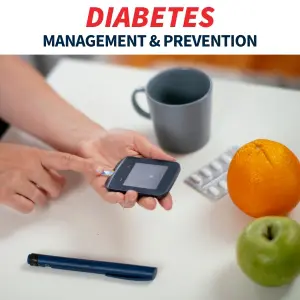May is National High Blood Pressure Education Month—a time to raise awareness about the risks of hypertension and the importance of keeping blood pressure under control. Often called the “silent killer,” high blood pressure typically presents no noticeable symptoms but significantly increases the risk of stroke, heart disease, kidney failure, and vision loss. According to the CDC, about 48% of U.S. adults have high blood pressure, yet only 1 in 4 are effectively managing it.
At Midwest Express Clinic we know that education, regular screenings, and healthy lifestyle choices are critical for prevention and long-term management. Monitoring your blood pressure regularly and staying informed about risk factors can help prevent serious health complications. Read on to learn more about hypertension risk factors and find out how to effectively manage blood pressure for long-term health.
Why Blood Pressure Education Month Matters
This national observance is a reminder to take proactive steps toward better heart health. Healthcare providers and organizations across the country use this time to highlight the importance of:
- Regular blood pressure checkups
- Home monitoring
- Lifestyle changes
- Community education and support
Raising awareness and encouraging action can significantly reduce the prevalence and impact of hypertension.
How Hypertension Affects the Body
Hypertension occurs when blood exerts too much force against artery walls. Over time, this can weaken blood vessels and increase the risk of stroke, heart attack, and other serious conditions. Symptoms like blurred vision, chest pounding, dizziness, headaches, or fatigue can occur—but often, there are no obvious warning signs until complications develop.
Risk Factors for Hypertension
Several conditions and behaviors can contribute to high blood pressure, including:
- Diabetes
- Obesity
- High sodium intake
- Lack of physical activity
- Smoking and alcohol use
- Chronic stress
Because hypertension can go unnoticed, routine screenings—like those offered at Midwest Express Clinic—are essential for early detection and management.
Lifestyle Changes to Help Manage Blood Pressure
National High Blood Pressure Education Month encourages everyone to adopt heart-healthy habits. Key lifestyle changes include:
- Eat a heart-healthy diet
Emphasize fruits, vegetables, whole grains, and lean proteins. Limit sodium, saturated fats, and processed foods. The DASH diet (Dietary Approaches to Stop Hypertension) is a proven strategy. - Get regular physical activity
Aim for at least 150 minutes of moderate exercise per week (e.g., brisk walking, swimming, biking). - Maintain a healthy weight
Even modest weight loss can significantly lower blood pressure and ease strain on the heart. - Avoid smoking and limit alcohol
Smoking and excessive alcohol intake can both raise blood pressure and harm cardiovascular health. - Manage stress
Practice relaxation techniques like deep breathing, meditation, yoga, or hobbies that help you unwind.
Prioritize Your Health with a Wellness Exam
National High Blood Pressure Education Month is the ideal time to take control of your heart health. Routine wellness exams—including blood pressure screenings— HTN screenings are a fundamental part of the wellness exam process at Midwest Express Clinic. During the exam, an experienced urgent care provider will assess baseline blood pressure and heart rate measurements in order to develop a personalized wellness strategy to help improve cardiovascular health.
Don’t wait to make your health a priority, take the first step toward preventing hypertension and its serious complications.
👉 Find your nearest location at midwestexpressclinic.com/locations.




